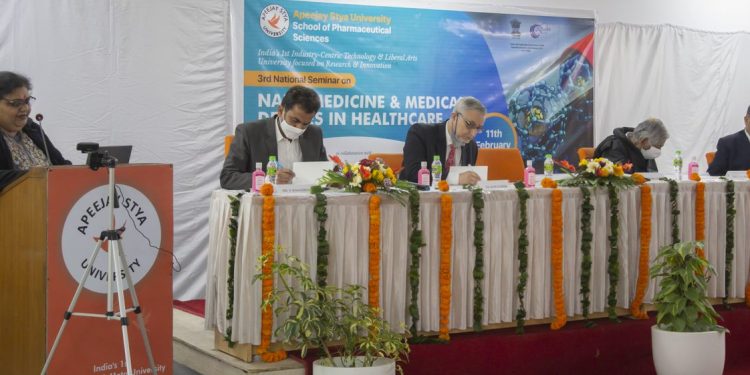ApeejayStya University, Gurugram recently hosted the 3rd National Conference on Nanotechnology and Medical Devices sponsored by the Science and Engineering Research Board (SERB) of the Department of Science & Technology (DST). The seminar witnessed eminent scientists and experts from the field of nanomedicine and medical devices technologies across the country, who put forward their perspectives on various aspects of the industry along with advocating the consolidation of the sector. Leading pharmaceutical and biochem companies Walter Bushnell and ASG Biochem were the collaborators of the event.
The seminar was also a platform for many faculty members, PhD scholars including post graduate and undergraduate students to exhibit their valuable research/review through Scientific Poster Presentation on various aspects related to theme. These posters were evaluated via online and offline mode by a set of Jury Members. 75 abstracts were received, out of that 51 were screened by scientific committee based on latest advancement in technology.
Professor Raj S Dhankar, Vice Chancellor, ApeejayStya University (ASU) highlighted the facts that India played a vital role during the last Covid waves and contributed effectively to quality medicine and vaccines to address the domestic as well as global demand. He added: “Availability of medicines at affordable prices and good infrastructure including medical devices play a very important role. We all have, in our lives, seen and realised the importance of healthcare. We have to really ensure that there is fair play and a strong regulatory mechanism in this area.”
Professor Bansi D Malhotra, DST-SERB (Distinguished Fellow & Adjunct Professor, Department of Biotechnology, Delhi Technological University (DTU), spoke about how nanomaterials-based conducting paper can be helpful in the development of biomolecular electronic devices like biosensors for cancer detection. A biosensor is an analytical device that converts a biological response into a measurable signal via a transducer.
Professor Alok R Ray (Ex-Consultant Professor, School of International Biodesign, All India Institute of Medical Science, New Delhi), said: “Most of the polymers that are used in medical devices are made in India. But we do not produce the final product because people from various fields like pharmaceutical, hardware, bioelectronics, nanodevices, etc, do not work together so much. They all must work in tandem to produce medical devices. The main requirements of this ecosystem are trained manpower and new concepts in the area of medical devices and implants. At present, we are manufacturing most of the base material used for these devices, but we are not producing any of these medical devices. One of the major lacunas is the trained manpower in this sector.”.
Dr VivekanandanKalaiselvan, Senior Principal Scientific Officer, Indian Pharmacopoeia Commission, Ghaziabad, spoke about “MateriovigilanceProgramme of India: Roles and responsibilities of Pharmacy professionals” while elaborating on the role of Indian Pharmacopoeia Commission that obtains scientific data, analyses and communicates it to the regulating authority.
Dr Manish Diwan, Head-Strategy Partnership & Entrepreneurship, Development BIRAC, Department of Biotechnology, Govt of India spoke about the growing startup ecosystem of the country. He highlighted how his organisation is inculcating a “culture of biotech entrepreneurship” through flagship schemes and other funding provisions.
Dr ArvindBansal, Professor of Pharmaceutics, NIPER, Mohali, Chandigarh, spoke on nanocrystals—the approaches used for its generation and its various applications. His presentation focused on NanoCrySP, a “novel “bottom-up” spray drying based method to generate solid particles containing API nanocrystals dispersed in non-polymeric excipients.”
Dr Dhiraj Kumar Chopra, Vice President & Head Sterile R&D, Amneal Pharmaceuticals, Ahmedabad, Gujarat, spoke on the key factors considered in polymer selection for drug delivery system, the importance of managing the rate of polymer degradation, use of polymers for depot injections that are non-toxic, controlled erosion and biocompatible, among others. “We should not get baffled by the failures that we may face while working with complex delivery systems but should work with perseverance and passion to provide the systems worldwide,” he said while concluding his presentation.
Dr. Anupama Diwan, Dean, School of Pharmaceutical Sciences, was the Organising secretary of the seminar.













